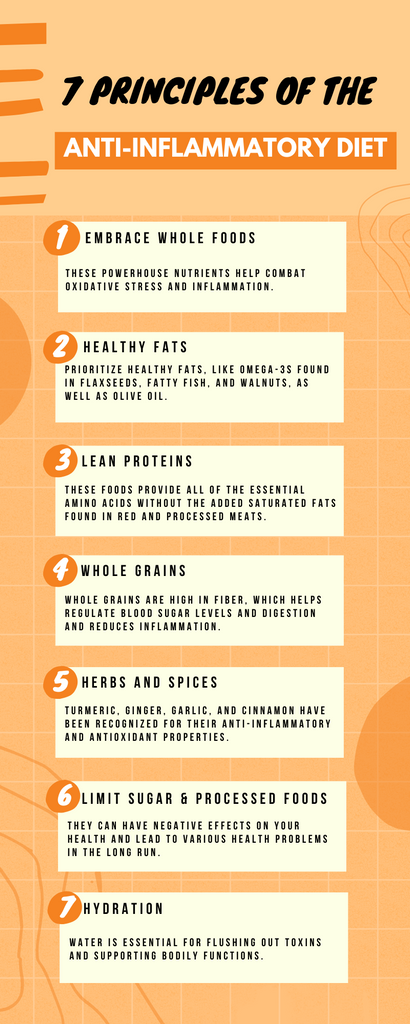7 Principles of the Anti-Inflammatory Diet
| March 12, 2024
In a world where processed foods and sedentary lifestyles dominate, the rise of chronic inflammatory conditions is becoming increasingly prevalent. The Anti-Inflammatory Diet is gaining traction as a holistic approach to combat inflammation, offering not just relief from symptoms but a pathway to overall well-being.
What is Inflammation?
Let’s grasp the concept of inflammation. As acute inflammation is a normal response to injuries or infections, chronic inflammation is an ongoing, low-level inflammation that can persist for an extended period. This persistent inflammation has been linked to several diseases, including diabetes, heart disease, and autoimmune disorders1.
The Role of Diet in Inflammation
The Standard American Diet (SAD), characterized by excessive intake of processed foods, refined sugars, and unhealthy fats, has been associated with increased inflammation.
On the other hand, the Anti-inflammatory Diet emphasizes whole, nutrient-dense foods that possess the power to reduce inflammation and promote overall health. Proteins, carbohydrates, and healthy fats should be incorporated into each meal, along with an adequate intake of vitamins, minerals, fiber, electrolytes, and water. 2,3,4
The Important Principles
- Embrace Whole Foods: The anti-inflammatory diet emphasizes eating whole, unprocessed foods that are enriched in antioxidants, vitamins, and minerals. It includes a variety of colorful fruits and vegetables in every meal. These powerhouse nutrients help combat oxidative stress and inflammation.
- Healthy Fats: Prioritize healthy fats, like Omega-3s found in flaxseeds, fatty fish, and walnuts, as well as olive oil, which is an integral part of the Mediterranean diet and celebrated for its anti-inflammatory effects, over saturated and trans fats.
- Lean Proteins: It's better to opt for protein-rich foods that are low in fat. Some good choices include fish, poultry, beans, and legumes. These foods provide all of the essential amino acids without the added saturated fats found in red and processed meats.
- Whole Grains: Choose whole grains, including brown rice, quinoa, and oats, instead of refined grains. Whole grains are high in fiber, which helps regulate blood sugar levels and digestion and reduces inflammation.
- Herbs and Spices: To add flavor and nutrition to your meals, try using a diverse range of herbs and spices in your cooking. Turmeric, ginger, garlic, and cinnamon have been recognized for their anti-inflammatory and antioxidant properties.
- Limit Sugar and Processed Foods: Excessive sugar and highly processed foods can contribute to inflammation. It's important to limit the amount of sugary beverages, sweets, and processed snacks that you consume. They can have negative effects on your health and lead to various health problems in the long run. So, it's best to keep your intake of these items to a minimum. Use fruits instead of artificial sweeteners to satisfy your sweet tooth5.
- Hydration: Adequate hydration is fundamental to any healthy diet. Water is essential for flushing out toxins and supporting bodily functions. Instead of sugary drinks, opt for water and consider herbal teas for added antioxidants.
Benefits of the Anti-Inflammatory Diet
Reduced Risk of Chronic Diseases
By addressing the root cause of chronic inflammation, the anti-inflammatory diet has the potential to reduce the risk of various illnesses, including heart disease, diabetes, and certain cancers12,13.
Weight Management
The emphasis on whole, nutrient-dense foods in this diet can aid in weight management. Additionally, maintaining a healthy weight contributes to reducing inflammation and promoting overall well-being14.
Improved Digestive Health
The fiber-rich content of the anti-inflammatory diet supports a healthy digestive system. As a fiber-rich food, it promotes regular bowel movements, prevents constipation, and promotes a diverse gut microbiome, which plays a vital role in immunity15.
Enhanced Mental Health
Recent studies indicate that there might be a correlation between the food we eat and our mental health. The anti-inflammatory diet, with its focus on nutrient-dense foods, may contribute to improved mood and cognitive function16.
The Bottom Line
The anti-inflammatory diet offers a holistic approach to maintaining good health by addressing both the symptoms and root causes of chronic inflammation. By adopting a diet that is rich in whole, nutrient-dense foods and making conscious choices, you can embark on a journey toward achieving improved well-being.
- Choosing a selection results in a full page refresh.
- Press the space key then arrow keys to make a selection.

